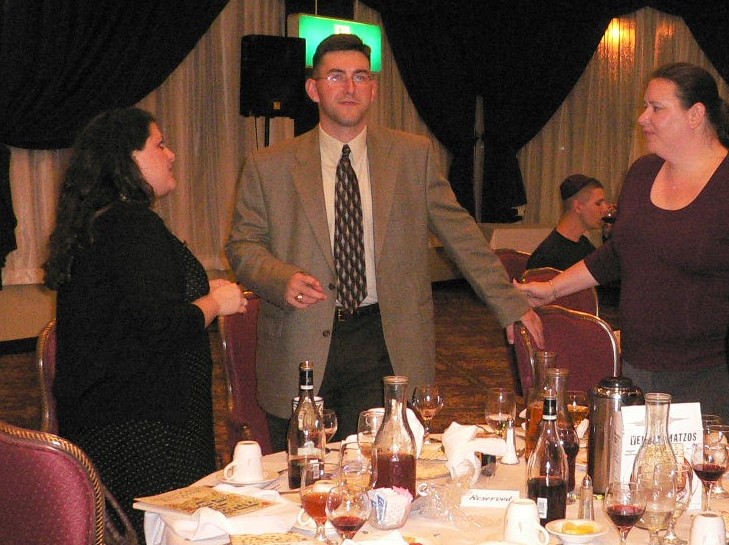 |
| Rabbi
Jessica Oleon (left) visiting Okinawa's Jewish community
for the 2006 Passover Seder along with lay leader
Jonathan R. Heesch (center) and his wife Dory A. Heesch
(right). |
|

Where Have All The Rabbis Gone?
Shortage of Rabbis causes a void
within Jewish overseas Military communities.
-- Jonathan Heesch
Where have all the Rabbis gone? This is the question asked by so many military congregations outside of the United States. The need for more Rabbis within the military
chaplainry is clearly evident. In the entire United States Navy, which supports both the Navy and the Marine Corps, there are only six Rabbis. Now, the exact number of Jews is a matter for the demographers to figure out; however, on a small island in the middle of the Pacific the lack of a Rabbi is very evident.
The island of Okinawa is located between the Japanese mainland and the
island nation of Taiwan. Okinawa is a Japanese Prefecture with a large US
military population whose primary mission is to keep North Korea on a leash and fight terror in Southeast Asia. Within this population, it is a fairly conservative estimate to say that there are at least a hundred Jews on the island.
The Jewish Community of Okinawa; is led by a Military Lay Leader who not only has the responsibility of leading the congregation, but also has to maintain his normal daily military duties. This does not allow the amount of dedication required of someone who is to provide guidance and support to the spiritual and moral well-being of the Jews of Okinawa.
This raises another issue: How qualified is the Lay Leader to serve in his particular position? Granted, the appointment has to be approved by a Rabbi; but with little in-depth training, and lack of thorough Jewish study how can one expect a community to thrive when the leader is not capable of teaching or guiding his congregants as well as one who is a professional at doing so?
During the period between 1945 and 2003 there was a Rabbi on the island of Okinawa. Since 2003, when the last Rabbi changed his duty station, the Navy
has not provided one. Some say that the Navy should move a Rabbi from the US to Okinawa. There are many arguments for this, including the fact that the military congregation is the only Jewish presence on the island. Unlike the military congregations back in the States who can go to civilian synagogues out in town,
the Jews of Okinawa do not have that option.
On the other hand, the personnel system for the Navy centers most of the Chaplains in areas that have large numbers of deployable units, as the Chaplains still have to support commands with their duties as the commander's advisor on morals and ethics; so, many of the congregants end up blaming the Navy for the lack of a Rabbi when we must look at the real problem.
The real problem is the recruitment of Rabbis. Recently the Navy Chaplains Corps passed a regulation allowing Cantors to become Chaplains, which opens up the eligibility pool for the
chaplainry. To the author's knowledge no one has raised their hand yet to come serve their country and those who fight the fight.
What causes this lack of interest? Lack of commitment to one's nation, or is it fear of going to a war zone, is it a general societal/cultural undercurrent of anti-military feelings? From discussions with some recent graduates of the Hebrew Union College the sentiments on campus are anti-war
and anti-military. Regardless of the student sentiment at HUC there are other
Yeshivas out there, as well as Rabbis who have already been ordained. Hopefully someone reading this will see the need for more Rabbis and take that step to become a Chaplain.
Becoming a Chaplain is easy if one is already ordained. An interested Rabbi needs only to contact the
Jewish Welfare Board or the Aleph Institute. Both of these organizations are Jewish
Ecclesiastical Granting Authorities for the Department of Defense. After acceptance into a particular service and a short
training program on military rules and regulations, one is sent to his or her first command. Also, for those that have yet to complete their ordination, there are scholarships available through the Jewish Welfare Board.
Granted, it is a difficult life, but it is definitely rewarding. Serving
one's country and one's fellow man, making an impact on the lives of Jews and non-Jews alike is not only an honor, but it also a
mitzvah.
Jonathan Heesch is the Lay Leader for the
Jewish Community of Okinawa and a Meteorologist for the US Marine Corps.
|

